4BR Time Team - February 2008
31-Jan-2008This month we delve into the history books to find out what was happening in the brass band world at various times in February from 1965 - 1998.
1965:
Boosey & Hawkes announced that from the 31st March that year they would cease production of high pitched instruments.
The death of T.J. Powell was also announced. The famous Welsh ‘Sousa’ died whilst conducting Cory at the BBC Studios in Cardiff.
The first Regional contest of the year was held in Scotland where Russell Mills conducted by Drake Rimmer took the championship honours ahead of Kinneil Colliery and Bo’ness and & Carriden.
Other section winners that year were Liddesdale Temperance, Barrhead Burgh and Monktonhall Coliery Silver.
1968:
40 years ago, on 17th February, the Welsh Area Contest took place at Brangwyn Hall in Swansea on the same day as a Fourth Round FA Cup tie between the locals and Arsenal (the Gunners won 1-0) and what was reported as the students ‘annual rag’.
Strange to report there were only 41 bands in attendance (this year it will be around 50) and the champion band was the now defunct Excelsior Ropes Works conducted by David Thomas who beat Lewis Merthyr (still going strong) and Cory.
Sadly, the winners of each of the other three sections; Cwmbran, Cwm and Abertysswg are no longer with us either.
Meanwhile, the death of Charlie Emmott, the former solo euphonium player with Black Dye was announced on the 12th, whilst the BBC Radio contest programme saw Kinneil Colliery (this year celebrating its 150th birthday) beat Cory.
The P.A.Y. – 68 campaign also tried to gather speed. P.A.Y. – 68?
Public Awareness Year 1968 for brass bands that’s what. The aim was to bring a wider public awareness of the growth and activities of the brass band movement through asking questions such as; Why no bands on TV? Why no press coverage of national events? Why so few broadcasts?
British Bandsman also featured a short article by the trumpet player of the Halle Brass Concert – pictured below. The performer who hoped that ‘a sprinkling of bandsmen’ would attend their latest concert at Salford University was the chap on the far right.
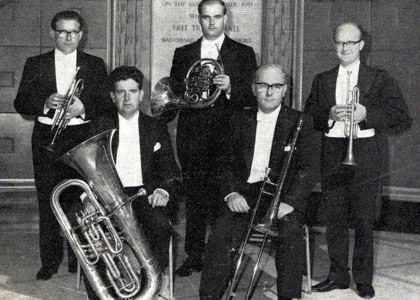
Halle Brass Consort
Recognize him? It’s Bram Gay no less…
1976:
The Black Dyke Band was announced as BBC Radio 3 ‘Band of the Year 1975’ - in February 1976 - for the most outstanding performance in the ‘Bandstand’ series during the year.
The judges were Ian Carson (Bristol); Ron Gardner (Birmingham); Robert Crawford (Edinburgh); James Langley (Manchester) and Charles Beardsall (London).
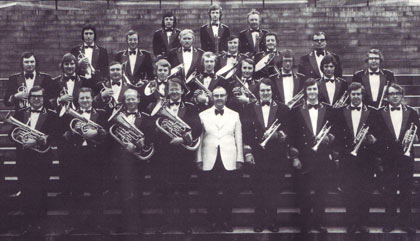
Black Dyke: 1975 BBC Band of the Year
The band contained some of the most famous names of the time in their ranks, including principals, Philip McCann, Frank Berry, John Clough, Kevin Wadsworth, David Carder and David Pogson as well as Colin Hardy, Derek Jackson, Fred Ellis, Jack Brooke, George Morgan, Malcolm Turton, Harvey Whitely and the great John Slinger - all under the direction of Roy Newsome.
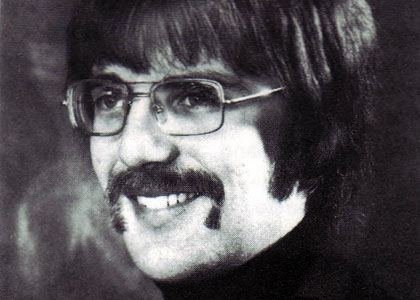 Yorkshire Imps took the Yorkshire Regional title ahead of Grimethorpe and Hammonds Sauce, whilst British Bandsman (which was published fortnightly during this period) announced that James Scott was to leave Brighouse & Rastrick after three years at the helm.
Yorkshire Imps took the Yorkshire Regional title ahead of Grimethorpe and Hammonds Sauce, whilst British Bandsman (which was published fortnightly during this period) announced that James Scott was to leave Brighouse & Rastrick after three years at the helm.
An up and coming conductor also featured in British Bandsman that month was the newly appointed MD at City of Coventry Band.
Recognise him? A certain Ray Farr esq.
1988:
The British Mouthpiece announced that Williams Fairey Band were the BBC Band of the Year, conducted by Roy Newsome and containing some pretty familiar names such as Brian Taylor, Nigel Fielding, Jimmy Leggett, Steve Walkley, Andy Gillooly and Shaun Crowther.
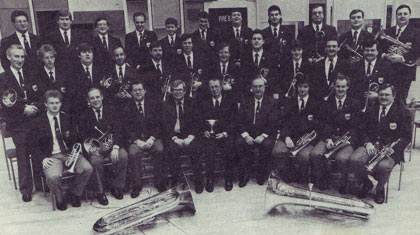
BBC Band of the Year 1988 - with Roy Newsome again
The undoubted kings of entertainment at the time, Desford Colliery Dowty won the Yeovil Entertainment Contest.
Desford’s winning programme that day included Howard Snell arrangements of ‘Folk Fesitval’, ‘Viennese Balls’ and ‘West Side Story’ whilst their winning soloist was Steven Mead with his rendition of ‘The Swan’ from ‘Carnival of the Animals’. The band though was not conducted by Howard Snell but by Robert Watson.
Grimethorpe revelled in the press coverage after their performance at the Barbican where Nicholas Childs performed John Golland’s ‘Euphonium Concerto’.
A young Martin Winter won the Besson/Normans Trumpet Competition held at Wembley Conference Centre whilst the Heart of England Band, formed from the remnants of the defunct Jones & Crossland Band won the Milton Keynes Contest on their debut appearance.
Black Dyke announced details of their forthcoming trip to Australia.
1993:
Brass Band World reported on the first RNCM Brass Band Conference.
Amongst the highlights was an open forum, described as a ‘possible milestone in British brass band history’. Conference director Howard Snell chaired the event in which a number of the most important topics concerning the future of the banding movement were discussed.
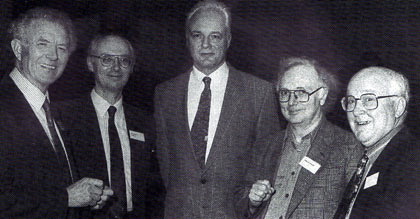
Conference leaders: Howard Snell and friends try hard for change
Peter Parkes put forward the idea of 30,000 players paying £5 each a year to the British Federation. Paul Hindmarsh aired the idea of a form of collective bargaining when dealing with the BBC.
The question of possible open adjudication was thrown out, whilst the possibility of the Nationals themselves being moved from London was said to have been given ‘consideration’ by Anne Marie Sizer of Boosey’s. There was even talk of the Musicians Union helping the Federation.
1998:
The Regionals were packed in February as the Scottish Championship took place at the beginning of the month and saw Howard Snell direct CWS Glasgow to victory, whilst at the end of the month Black Dyke under James Watson took the honours in Yorkshire.
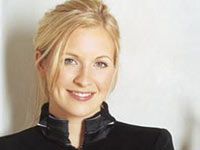 Elsewhere, Tredegar won at Yeovil, Sandefjord won the Norwegian Nationals and Philip Sparke won a cool £10,000 after being awarded the prestigious Sudler Wind Prize in America.
Elsewhere, Tredegar won at Yeovil, Sandefjord won the Norwegian Nationals and Philip Sparke won a cool £10,000 after being awarded the prestigious Sudler Wind Prize in America.
The BBC announced plans to cut back on its brass band output across its radio channels whilst the British Federation and the Brass Band Heritage Trust announced the appointment of its first full time development officer.
Jim Davies stepped down from his position as principal cornet at Brighouse & Rastrick whilst a young 19 year old trumpet player who occasionally played with Redbridge Band made it through to the BBC Young Musician of the Year Brass semi final.
What did ever happen to Alison Balsom?















